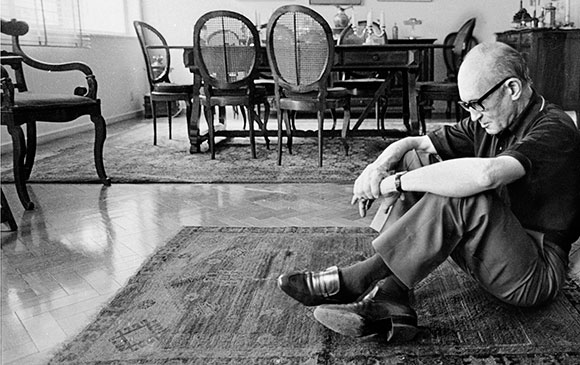Today I read a well-known poem by the famous Brazilian poet Carlos Drummond de Andrade (1902-1987). The original is called ‘LEMBRANÇA DO MUNDO ANTIGO‘, and I go with the following English translation:
Souvenir of the ancient world
Clara strolled in the garden with the children.
The sky was green over the grass,
the water was golden under the bridges,
other elements were blue and rose and orange,
a policeman smiled, bicycles passed,
a girl stepped onto the lawn to catch a bird,
the whole world—Germany, China—
all was quiet around Clara.The children looked at the sky: it was not forbidden.
Mouth, nose, eyes were open. There was no danger.
What Clara feared were the flu, the heat, the insects.
Clara feared missing the eleven o’clock trolley:
She waited for letters slow to arrive,
She couldn’t always wear a new dress. But she strolled in the garden, in the morning!
They had gardens, they had mornings in those days!
The beginning is teeming with colors, like Brazilian carnival. It’s an innocent scene, when a policeman (Guarda civil in the original) smiles and people ride bicycles. When a girl is going to catch a bird we are not sure if it’s still innocent, and when the whole world (o mundo inteiro) is quiet around the woman (is she the mother?) we suspect something is going on.
The second stanza confirms this by mentioning that it was explicitly not forbidden to look at the sky. When freedoms are exlicitly not forbidden, it can haunt our minds more than when they are prohibited. The children are taking in the colors, no danger. But Clara was fearful of both tropical things (flu, heat, insects) and things from the ‘old world’ (the trolley with its timetable bringing her letters, presumably of the man who is absent in this poem).
She wasn’t very wealthy, but free. Why is it so special that there were gardens and even mornings in ‘those days’? We should know that the poem was published in 1940. All of a sudden we understand the man is fighting in World War 2, and Clara is eagerly awaiting his letters. I assume that Clara is in Brazil and that the ‘mundo antigo’ has been preserved on the South American continent a little bit longer than in Europe, where it was being destroyed by the unthinkable violence of the nazis that would soon affect the entire world.
Here is another small poem by Drummond the Andrade that I like, so I thought I just copy paste it here:
O mundo é grande e cabe
nesta janela sobre o mar.
O mar é grande e cabe
na cama e no colchão de amar.
O amor é grande e cabe
no breve espaço de beijar.

One thought on “Reading: Souvenir of the ancient world by Carlos Drummond de Andrade”
Comments are closed.